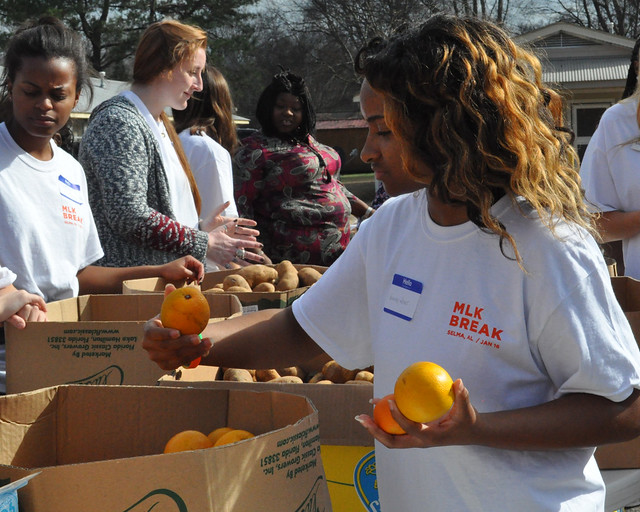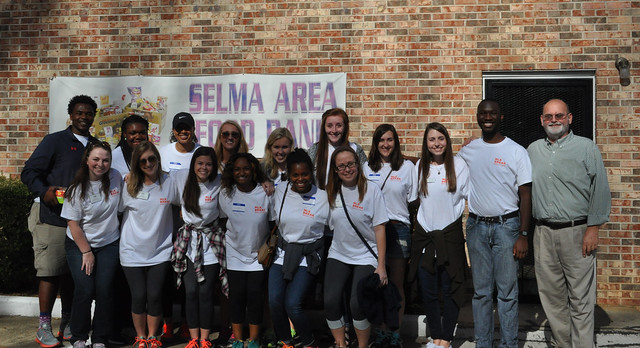‘Passion for serving’: Students give back over spring break
Article body
While some Auburn University students are relaxing at the beach this week for spring break, 45 others are lending a hand with various service projects as part of the Alternative Student Breaks organization.
Students in Alternative Student Breaks, or ASB, are traveling to Kissimmee, Florida, Hendersonville, North Carolina, Quito, Ecuador, and San Cristobal, Dominican Republic, to volunteer their time and talents over Auburn's spring break March 13-17.
In Kissimmee, students are working with children who have terminal illnesses as part of a partnership with Give Kids the World Village. Students in Hendersonville are volunteering with a local organization called Housing Assistance, where they are helping in the construction of housing and housing repairs around the city. Participants are working directly with members of the community as they provide them with hope for a brighter future. In San Cristobal, students have the opportunity to run a basic street medical clinic, help with a feeding program for the neighborhood children, renovate a community park and more. Students volunteering in Quito are traveling to open-air markets each day and assisting the on-site educator with providing activities and games for children.
"College students often do not have a lot of money or physical resources, but what they do have is a passion to serve those around them," said program advisor Robert Powers. "It is incredible to see Auburn students realize how rare this opportunity is to have a week to use as they wish, and many of them are choosing to use that time giving back to others."
Powers said he often describes ASB as "the toughest break you will ever love" because it brings students out of their comfort zones and makes them work hard, but it also teaches them more about themselves and how they can have a positive impact on the world.
"Students are able to see and learn about significant social issues," Powers said.
One student who has realized his passion for serving others is Hunter Whitten, president of ASB.
"By spending my break doing outreach, I can help other people who are in need and that gives me a greater joy than going skiing or to the beach," he said.
Whitten has gone on six trips during his time as an Auburn student, starting with a disaster relief effort in Atlanta City, New Jersey, and ending with his most recent project, an MLK Day of Service focused on community development in Selma. He's also assisted with disaster relief in Moore, Oklahoma; helped with affordable housing in Hendersonville; worked on community development in La Fortuna, Costa Rica; and served in children's healthcare in Little Rock, Arkansas.
"Going on an ASB trip is more than just helping others, which is a big part of it, but it also allows you to learn more about yourself," Whitten said. "I have been able to truly find out who I am as a person, as a leader and as an Auburn student."
The organization began in 2009 with a spring break trip to Charleston, South Carolina. The organization has expanded to include 11 trips per year, three of which are international. ASB's first international trip was to Quito, Ecuador, during winter break 2011.
Each trip consists of about 10-12 students, and the organization anticipates approximately 155 students and 10 advisors will go on 11 trips during the 2016-2017 academic year.
Related Media
Media interested in this story can contact Communications Director Preston Sparks at (334) 844-9999 or preston.sparks@auburn.edu.
Auburn University is a nationally ranked land grant institution recognized for its commitment to world-class scholarship, interdisciplinary research with an elite, top-tier Carnegie R1 classification, life-changing outreach with Carnegie’s Community Engagement designation and an undergraduate education experience second to none. Auburn is home to more than 30,000 students, and its faculty and research partners collaborate to develop and deliver meaningful scholarship, science and technology-based advancements that meet pressing regional, national and global needs. Auburn’s commitment to active student engagement, professional success and public/private partnership drives a growing reputation for outreach and extension that delivers broad economic, health and societal impact.






